Key takeaways:
- Post-adoption support is crucial for building trust and emotional connections between pets and their new owners.
- Access to resources, behavior training, and a supportive community helps new pet owners navigate challenges and fosters lasting relationships.
- Financial planning and emotional support are essential aspects often overlooked in post-adoption experiences.
- Educational resources, community groups, and professional guidance can significantly enhance the post-adoption journey for both pets and owners.
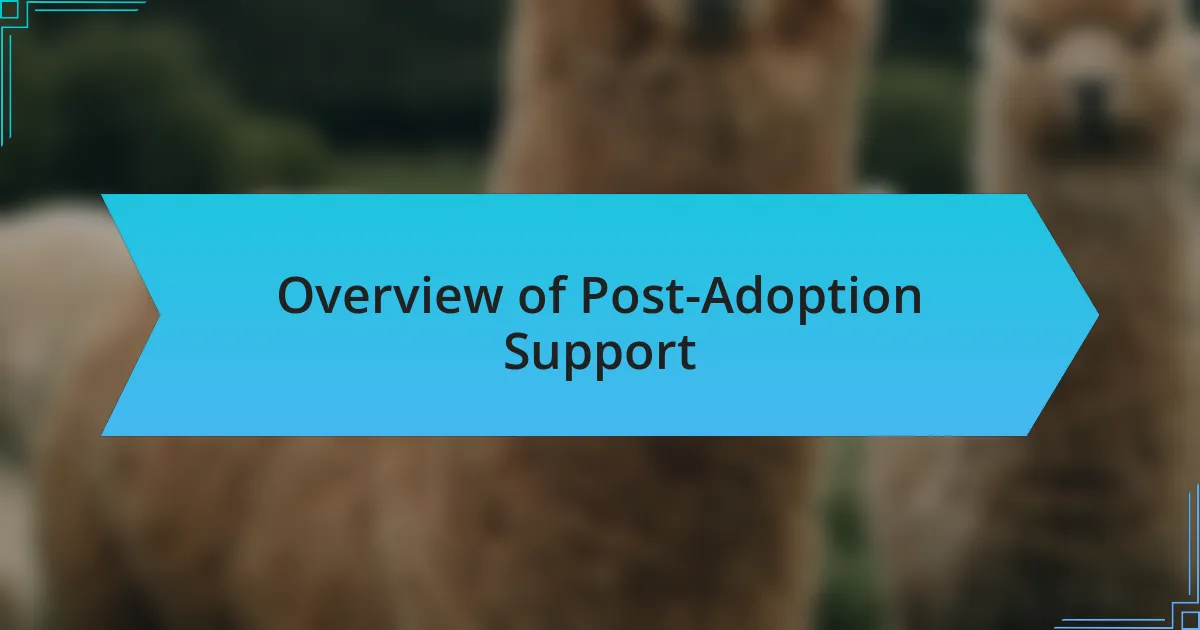
Overview of Post-Adoption Support
Post-adoption support is essential in ensuring a smooth transition for both the pet and the new owner. I’ve seen firsthand how overwhelming the initial days can be. Have you ever wondered what it feels like to bring home a nervous pup? It takes time and patience to build trust, and having support can make all the difference.
One of the most valuable aspects of post-adoption support is access to resources and training. For instance, when I adopted my cat, I benefitted immensely from workshops on behavior management. I remember a session where we learned about common feline quirks—like why my cat loved to hide in boxes. It made me appreciate her personality so much more and strengthened our bond.
Emotional support also plays a crucial role in this journey. Adopting a pet isn’t just about providing a home; it’s about creating a loving environment where they thrive. Have you ever felt unsure about your choices as a new pet parent? Those moments of doubt can be tough, but knowing help is just a call away provides comfort. Post-adoption support fosters a community where shared experiences and advice make the journey manageable and enjoyable.
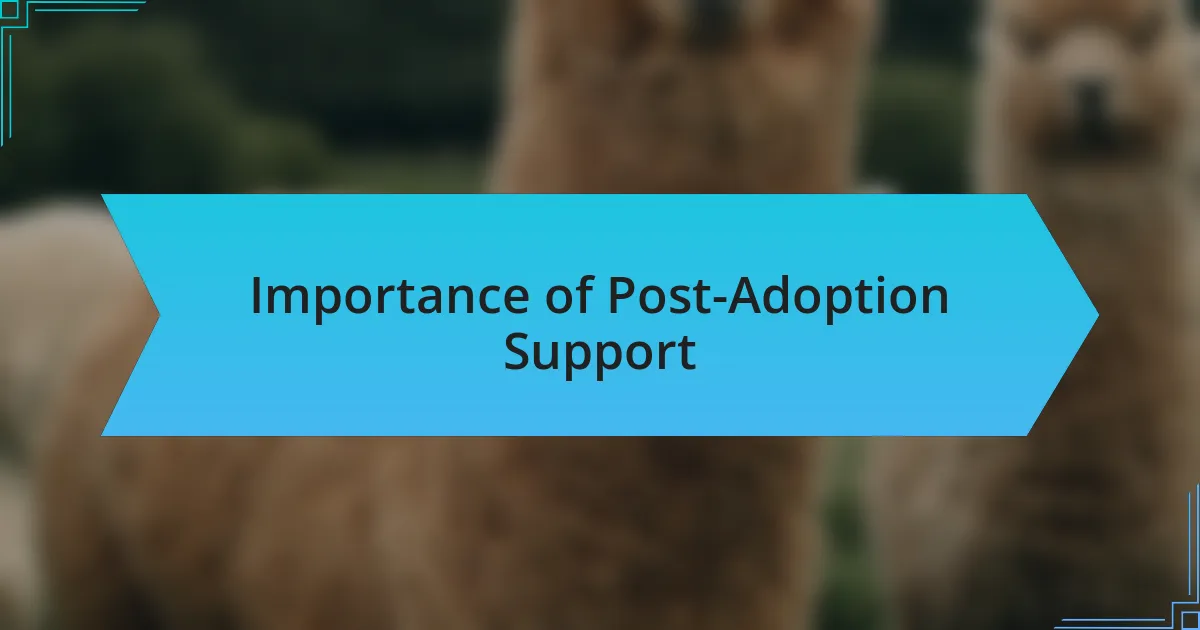
Importance of Post-Adoption Support
Post-adoption support is crucial because it helps ensure that the bond between the pet and owner grows stronger over time. Think about those first few weeks—it can feel like an emotional rollercoaster. I remember the initial excitement of adopting my rescue dog, only to face the challenges of separation anxiety. Knowing that resources were available made it easier to navigate those tough nights when he howled for companionship.
Furthermore, ongoing support provides essential guidance in addressing behavioral issues that may arise as the pet settles into their new home. When my dog started digging in the garden, I was stumped. Thankfully, a trainer provided insights into his need for stimulation and offered practical exercises to channel his energy. It transformed our relationship and turned a frustrating situation into an exciting bonding experience.
Additionally, the connection established through post-adoption support can foster lasting friendships among pet owners. Have you ever met someone who truly understands what you’re experiencing? Joining a local pet owner group made me realize I wasn’t alone in my struggles and joys. Sharing stories and tips not only enriched my journey but also created a sense of community that became a safety net for both me and my pet.
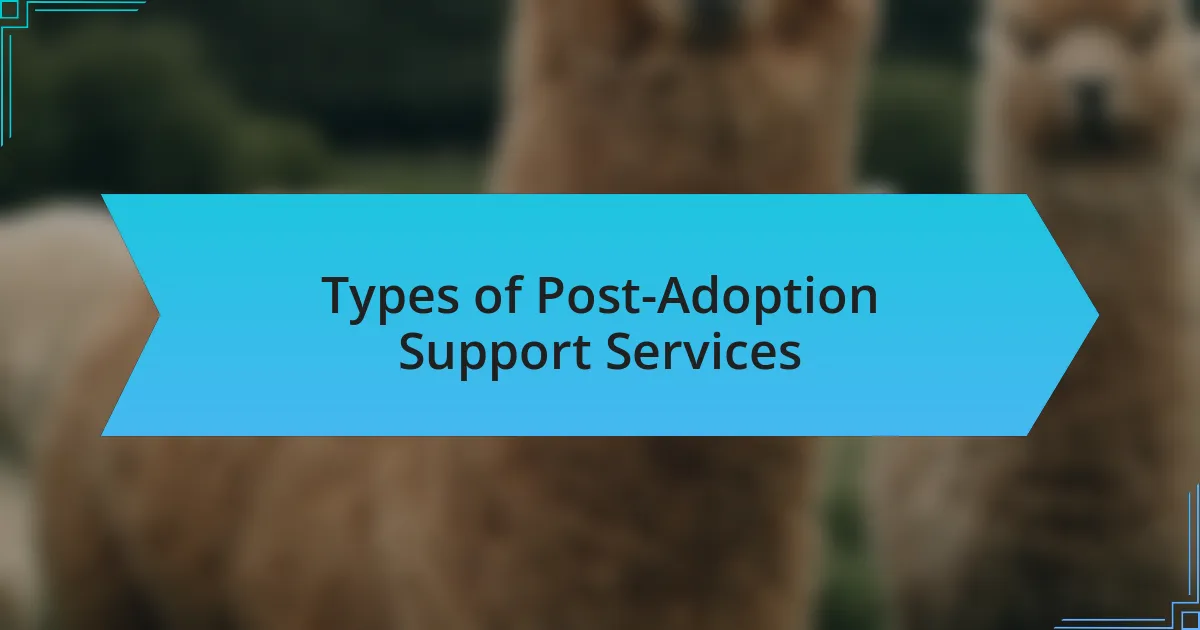
Types of Post-Adoption Support Services
One significant type of post-adoption support is behavior training. Many new pet owners, including myself, often find themselves puzzled by their pet’s quirky habits. I vividly recall when my cat began to exhibit signs of aggression. Seeking help from a behaviorist not only helped me understand her fears but also equipped me with tools to foster a healthier environment. Wouldn’t it be great if every pet owner received similar guidance to strengthen their relationship with their furry companion?
Veterinary resources play a crucial role in post-adoption support as well. Regular check-ups and health advice are essential, especially during that adjustment phase. I once neglected my dog’s diet and noticed changes in his energy levels, which concerned me. Consulting with a veterinarian clarified my worries and helped ensure he was getting the right nutrition. It’s easy to overlook these aspects when you’re caught up in the excitement of adoption.
Socialization opportunities are another vital component of post-adoption support services. When I first adopted my pup, she was timid and hesitant to interact with other dogs. Participating in group training classes allowed her to gain confidence and develop social skills. Aren’t social interactions just as important for pets as they are for us? By engaging with other pet owners and their animals, I discovered not only a nurturing environment for my dog but also a supportive network of fellow pet enthusiasts.
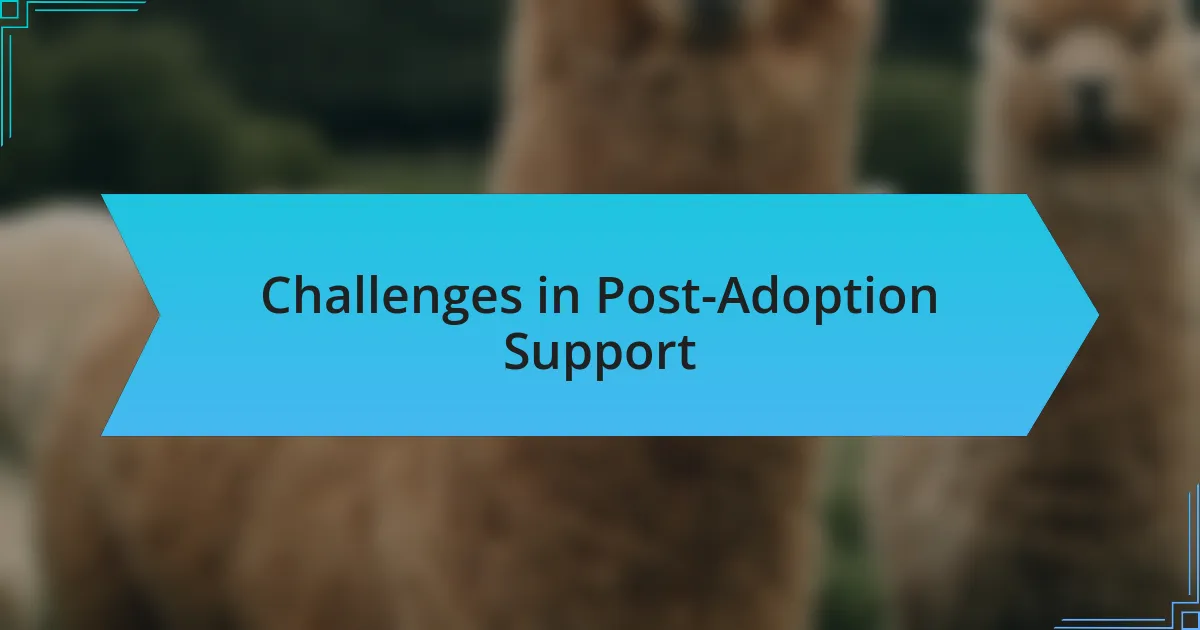
Challenges in Post-Adoption Support
Adopting a pet is a joyful experience, but the challenges in post-adoption support can become overwhelming. For instance, I once faced difficulty in managing my dog’s anxiety, which surfaced long after bringing him home. Trying to figure out what might trigger his fears felt like navigating a maze with no exit in sight. Wouldn’t it be reassuring if more resources were readily available to address such behavioral issues?
Another challenge often arises from the financial aspects of post-adoption support. I remember budgeting for my new pet’s needs but didn’t fully anticipate the costs of ongoing veterinary care and training. It’s frustrating when unexpected expenses crop up and strain your resources, leaving you to wonder if you can provide the best care possible for your furry friend. Are we doing enough to plan for these financial realities when we adopt?
Lastly, emotional support for both the pet and owner can sometimes be overlooked. When I adopted my cat, there were moments when I felt the weight of responsibility, as if I were her only lifeline. I realized that having access to a community of fellow pet owners who shared similar experiences could have alleviated my fears. Isn’t it important to foster connections not only for our pets but also for ourselves as we navigate this journey together?
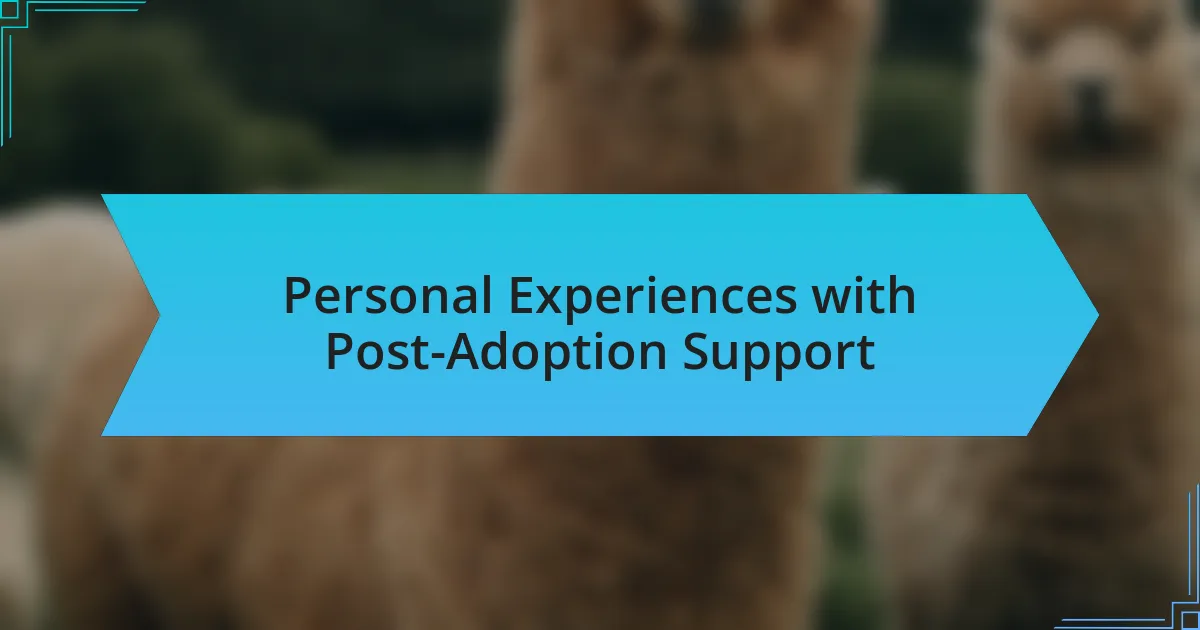
Personal Experiences with Post-Adoption Support
When I adopted my rescue dog, the euphoric feeling of finally bringing him home quickly met the reality of post-adoption support. I vividly recall my first trip to the vet for a follow-up check-up, where the vet pointed out that he needed a dental cleaning that I hadn’t anticipated. It left me wondering how many new pet owners face this same surprise, underscoring the importance of ongoing education for adopters about their pet’s health.
On another occasion, I experienced the need for emotional reassurance during a particularly tough week. My dog had an accident in the house, and I felt a surge of frustration and guilt wash over me. I would have appreciated having someone to talk to who understood the rollercoaster of emotions we face as new pet owners. It pushes me to think—how could organized support networks better facilitate open discussions about these struggles?
Then there was that time my dog seemed to regress in his training, and I found myself questioning whether I was the right owner for him. In those moments, it felt so isolating, especially since so many others were sharing their success stories online. Wouldn’t it be wonderful if there was a dedicated mentorship program through adoption agencies, pairing new pet owners with seasoned adopters who could share their insights and encourage us through the rough patches?
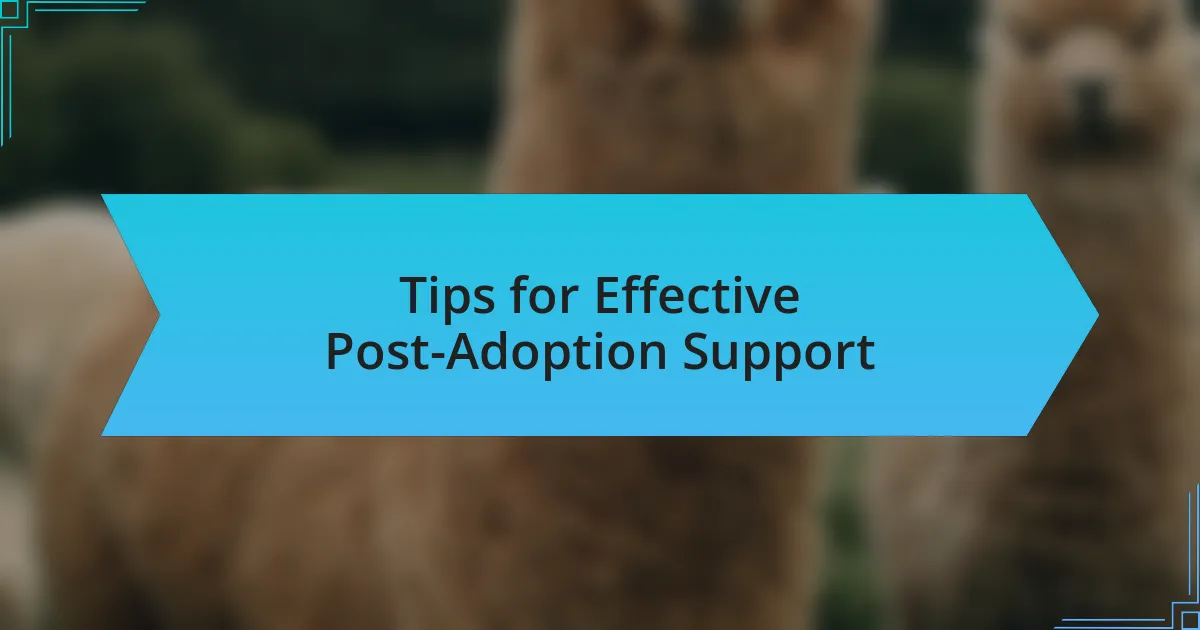
Tips for Effective Post-Adoption Support
Effective post-adoption support is crucial for steering new pet owners toward success. I learned this firsthand when my cat suddenly became shy and hid for days after we brought him home. I quickly realized that having access to resources about behavioral changes could have eased my anxiety. What if we had regular webinars or meet-ups to discuss such experiences? It would create a strong sense of community where questions are welcomed.
In my journey, I found that creating a routine with my new pet made a significant difference. After a few weeks, I noticed that the consistency helped him feel more secure. Isn’t it fascinating how animals thrive on predictability? If adoption agencies could provide customizable schedules or behavior tracking tools, it might empower adopters and encourage them to stick with their new pet’s training.
Moreover, sharing success stories can be a powerful motivator. I always remember the joy of seeing my dog learn to sit after weeks of practice. I wish there were platforms dedicated to celebrating these milestones, where adopters could share their victories with others. Couldn’t it be uplifting to have dedicated channels for highlighting these moments, inspiring others in their journey?
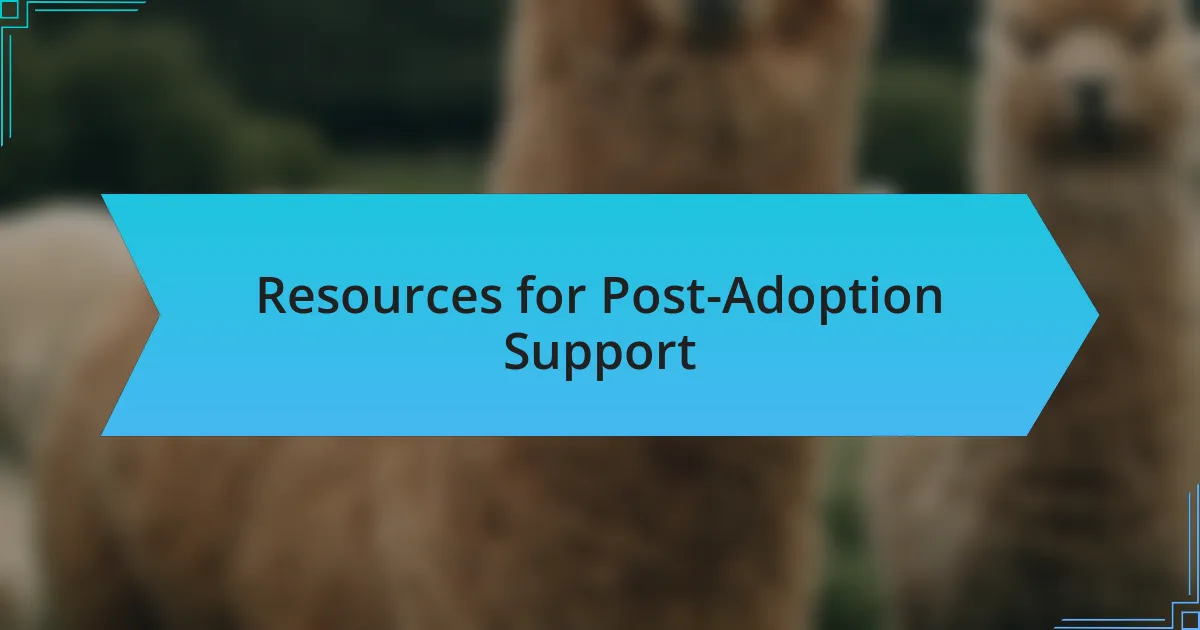
Resources for Post-Adoption Support
Access to educational resources is essential for adopters navigating their new responsibilities. I remember feeling overwhelmed by the plethora of information available but also unsure about where to start. Wouldn’t it be beneficial for adoption agencies to curate a simple guide or a list of reliable websites dedicated to pet care and training? Having a one-stop resource could make the transition smoother for everyone.
In my experience, local community groups can serve as invaluable hubs for post-adoption support. When I joined a local pet owner group, I suddenly found a network of experienced individuals willing to share their stories and tips. How powerful would it be to host regular workshops or training classes in these communities? It could foster connections, allowing adopters to ask pressing questions and learn directly from those who’ve been in similar situations.
Additionally, helplines or chat services staffed by trained professionals can make a world of difference. I recall a particularly anxious moment when my dog displayed signs of separation anxiety. Reaching out to a professional who understood such behaviors helped me navigate that challenge. Isn’t it reassuring to know that expert assistance is just a call or click away? Having immediate access to advice could alleviate many concerns new pet owners face.